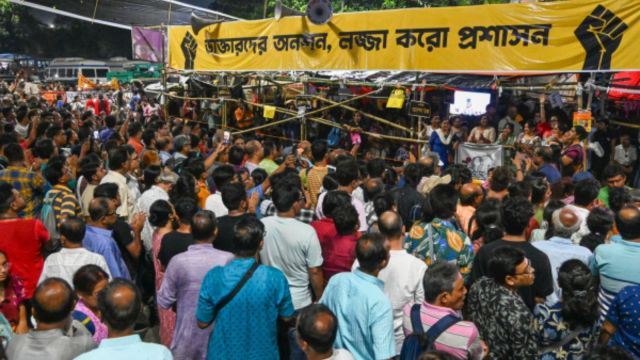Defending its civic volunteer scheme which ran into controversy following the R G Kar Hospital rape and murder case, the Mamata Banerjee government had told the Supreme Court in November that the volunteers “are functioning satisfactorily” and are not entrusted with law enforcement duties.

In its affidavit filed in the top court, the state government provided details such as the recruitment process for volunteers and the duties assigned to them.
The affidavit said: “The Civil Volunteer Force is set up to assist the police… in respective units of traffic management… in major festivals… regarding unauthorised parking of vehicles… in ensuring public safety” and “any other duties/responsibilities to be assigned by the respective heads of unit”.
It added: “Civic volunteers have not been assigned duties in connection with police stations (except for those mentioned hereinabove) or for any law enforcement duties, including investigating crimes.”
The rape and murder sparked widespread condemnation across the country, leading to the Supreme Court taking suo motu cognisance and monitoring the investigation by the CBI.
In the meantime, an umbrella body of five doctors’ organisations — Doctors United for People’s Health Right & Dignity of Medical Profession— approached the SC seeking the scrapping of the scheme.
Story continues below this ad
Their plea highlighted concerns over the ‘Rattirer Sathi Scheme (helper at night)’ announced by the state to address the safety and security concerns of women at their workplaces along with hospitals in the wake of the R G Kar incident.
They contended that the state continues to perpetuate the scheme despite the principal accused, Roy, being a civil volunteer.
Appearing for the doctor’s association, senior advocate Karuna Nundy said the state is violating the Calcutta High Court directions that no law and order function may be discharged by civic volunteers and such civilians. She also referred to the Supreme Court’s July 2011 judgment directing the Chhattisgarh government to disband the controversial Salwa Judum militia — which recruited tribal youths as special police officers to fight Maoists.
Hearing the plea on October 15, 2024, the then Chief Justice of India D Y Chandrachud had remarked: “We want to know what you are doing because otherwise this is a nice process of conferring political patronage on people who are totally unverified.”
Story continues below this ad
The three-judge bench asked the state to file an affidavit explaining the scheme in detail, specifically seeking the selection process for recruitment and the steps taken to ensure such volunteers do not operate in establishments such as hospitals and schools where women and children may be vulnerable. It said: “The affidavit shall specifically disclose whether any of the civic volunteers are assigned duties in or in connection with police stations or for the investigation of the crime.”
In its response dated November 1, 2024 (the application by the doctors’ body is yet to come up for hearing after the October 15 direction), West Bengal’s Department for Home and Hill Affairs said: “The selection of the civic volunteers was conducted through interviews by a selection committee consisting of the Superintendent of Police or Commissioner of Police as Chairman, along with one Additional Superintendent of Police or Deputy Commissioner of Police or Assistant Deputy Commissioner of Police, and one Deputy Superintendent of Police or Assistant Commissioner of Police.”
It said that “for Government Railway Police, the committee consisted of the Superintendent of Railway Police and two Deputy Superintendents of Railway Police”.
One the eligibility criteria, the state said: “The candidate must be a resident of the police station area where they would be deployed; age between 20 to 30 years as of January 1st of the respective year of enrollment; the candidate must have passed the Madhyamik Standard Examination; participation in school or club-level sports was required; prior experience as an NCC cadet, boy scout, NSS guide or civil defence volunteer was preferred; no criminal record should exist; the candidate must be medically fit.”
Story continues below this ad
The state submitted that the antecedents of the candidates are also verified to ensure they have no criminal record.
The affidavit said that the circular mentioning the duties of the civic volunteers was also placed before the Calcutta HC in a matter in March 2023 and the HC had directed that the same be strictly enforced.
The state said that these volunteers were initially paid a daily honorarium of `141.81 which was raised to `10,000 per month.
The affidavit said a total of 4,522 civic volunteers, 870 of whom are women, are deployed in government and private hospitals, nursing homes and primary health centres; 339 civic volunteers, including 77 women, “are deployed in educational institutions to assist police officials.
Story continues below this ad
The state said “civic volunteers are functioning satisfactorily” and it had “already proceeded towards imparting adequate training of about three months” to them.









